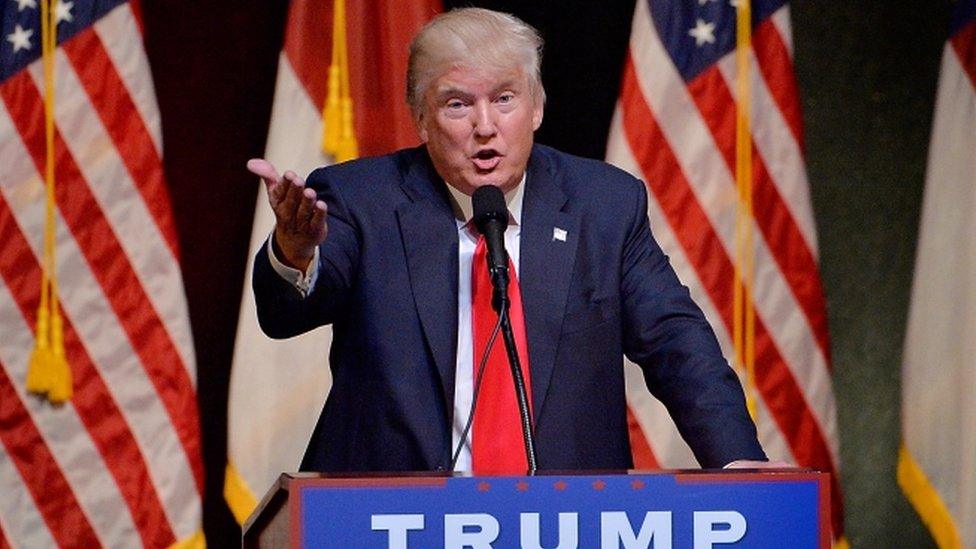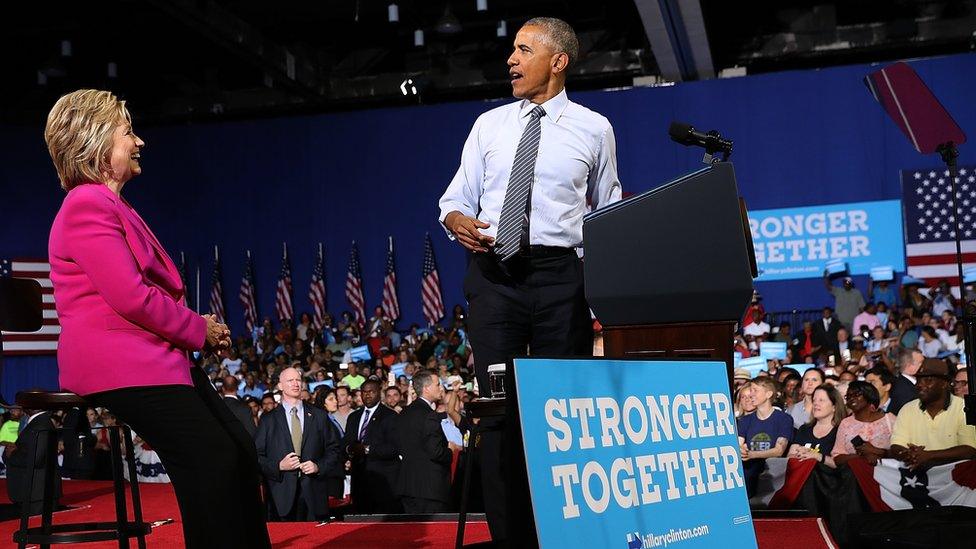Hillary Clinton emails 'endangered US' - Donald Trump
- Published
Clinton, her emails and the FBI
Hillary Clinton's use of private email while secretary of state put the "entire country in danger", US Republican Donald Trump has said.
The FBI's decision not to recommend criminal charges against her is the greatest example yet that the system is rigged, he told a North Carolina rally.
Democrat Mrs Clinton and Mr Trump are their party's likely choices to do battle for the White House in November.
They are expected to be made the official nominees later this month.
FBI Director James Comey said Mrs Clinton had been careless in how she handled sensitive information but there was no case to bring criminal charges because there was no evidence of intent.
Speaking in Raleigh, Mr Trump disagreed and said the system had been set up to protect the Clintons - she had put the "entire country in danger" and had probably been hacked.
"Her judgment is horrible," he said, adding: "She will be such a lousy president, folks."
The New York businessman also said that Attorney General Loretta Lynch had been bribed, getting a promise she would keep her job in return for allowing Mrs Clinton to escape prosecution.
At the same rally, Mr Trump offered qualified praise for former Iraqi leader Saddam Hussein.
"Saddam Hussein was a bad guy," Mr Trump said. "But you know what he did well? He killed terrorists. He did that so good. They didn't read them their rights."

Mr Trump said rival Mrs Clinton would make a "lousy president"
Other Republicans were also critical of the FBI decision. House Speaker Paul Ryan said it "defied explanation".
"Declining to prosecute Secretary Clinton for recklessly mishandling and transmitting national security information will set a terrible precedent," he said.
No-one more qualified for this office than Clinton, says Obama
The FBI's key findings:
It is possible that "hostile actors" gained access to Mrs Clinton's email account
There were more than 100 emails that contained classified information when they were sent or received, contrary to her claim she never sent classified emails
But there was no evidence she had knowingly shared sensitive material
She did not delete emails in an effort to conceal them, no evidence of cover-up
Hours later, she appeared on stage with President Barack Obama in Charlotte, North Carolina.
Neither of them mentioned the case. Instead, Mr Obama offered her an enthusiastic endorsement at the rally - his first appearance with her during the campaign.

With Obama at her side: Kim Ghattas, BBC News, Charlotte

Appearing together at a rally neither of the two mentioned the FBI's decision
They were once rivals, but their political destinies are now tied. Eight years after Clinton campaigned for him, Obama took to the election trail for her and gave her a huge boost by bringing his unparalleled skills as a campaigner and orator to Charlotte for their first joint appearance.
The role reversal was striking. She spoke first as the president sat behind her, arms crossed, listening, in his new role as her most high-profile surrogate. She made a reference to their bitterly fought campaign in 2008 and their political reconciliation as proof of what Americans could achieve when they came together.
The president used one of his favourite lines from his campaigning days to get the crowd "fired up and ready to go" as he told supporters he was counting on them to get Clinton to the White House. He knows that to preserve his legacy he needs her victory.
Standing on the sidelines, her aides, who had been there in the bitterly cold days of Iowa in 2008, watched almost in disbelief that their journey could have led them here.
Neither Clinton nor Obama addressed the FBI investigation into her private email set-up, but that cloud has now partly lifted and Clinton's team seemed relieved. But Republicans will use Mr Comey's words about her email arrangement -"extremely careless" - against her at every turn.

Hillary Clinton: "Donald if you are out there tweeting it's Hawaii".
Mr Obama said he believed in Mrs Clinton and there had never been any man or woman more qualified for the presidency.
Mrs Clinton's campaign spokesman backed the decision but admitted it had been a "mistake" for her to use personal email.
Her personal email server, which she used for both government and personal business, has haunted her campaign since the issue first emerged in March 2015.